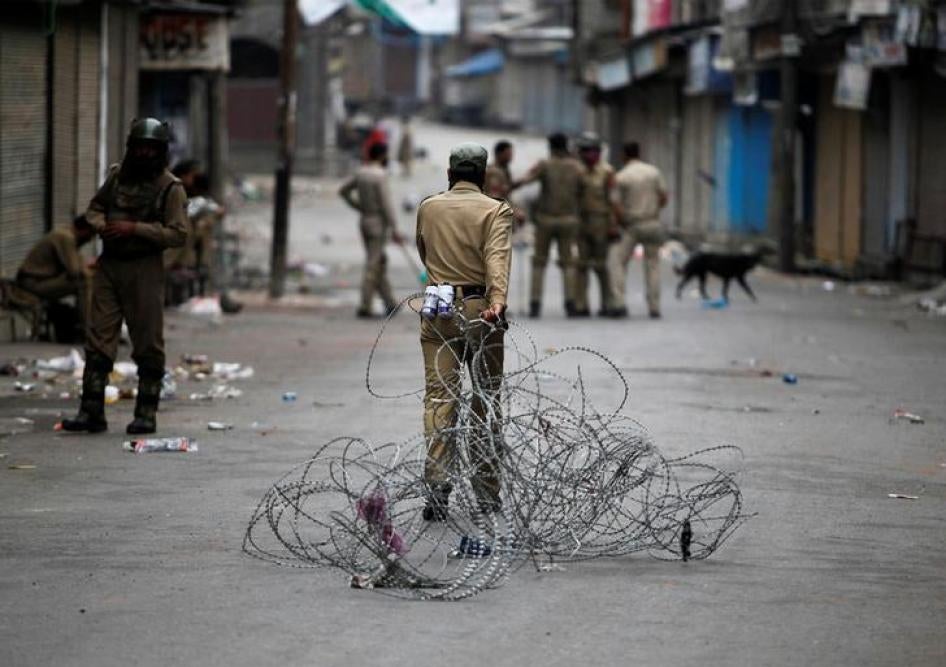(New York) – Indian authorities should credibly and impartially investigate police use of force during violent protests in Jammu and Kashmir state that have killed more than 30 people and injured hundreds, Human Rights Watch said today.
Since the killing of Burhan Wani and two other Hizb-ul-Mujahedin militants in an armed exchange with government forces on July 8, 2016, demonstrations have occurred in various parts of the state in which protesters have hurled rocks. State security forces have responded by firing pellet guns, teargas, and live ammunition.
“Rock-throwing at demonstrations is serious but does not provide police a free pass to use force against protesters,” said Meenakshi Ganguly, South Asia director at Human Rights Watch. “The Indian authorities need to send a clear message that lethal force is only an option when a life is at imminent risk, and those misusing force will be held accountable.”
While law enforcement officials have a duty to protect lives and property, they should use nonviolent means as far as possible, only use force when unavoidable and in a proportionate manner, and use lethal force only when absolutely necessary to save lives, Human Rights Watch said.
Wani, 22, had a large following among Muslim Kashmiris who shared his demands for secession and an end to abuses by government security forces. After his death, thousands attended his funeral. The protests started soon after, and the government ordered a curfew and blocked the Internet in some places.
The Indian Express reported that hospitals were packed with injured protesters. One ophthalmology ward said that doctors had performed nearly 100 eye surgeries on people with pellet gun injuries. Indian security forces have been using pellet guns as a nonlethal option for crowd control after nearly 120 people were killed during weeks of protests in 2010. The use of pellet guns since 2010 has reportedly resulted in at least 300 hospitalizations in Srinagar, including 16 cases in which the patient lost their sight completely.
The Indian government should publicly order the security forces to abide by the United Nations Basic Principles on the Use of Force and Firearms by Law Enforcement Officials, Human Rights Watch said. The Basic Principles state that security forces shall “apply non-violent means before resorting to the use of force and firearms,” and that “whenever the lawful use of force and firearms is unavoidable, law enforcement officials shall: (a) Exercise restraint in such use and act in proportion to the seriousness of the offence and the legitimate objective to be achieved; (b) Minimize damage and injury, and respect and preserve human life.” Furthermore, “intentional lethal use of firearms may only be made when strictly unavoidable in order to protect life.”
The Basic Principles further provide that, “[i]n cases of death and serious injury or other grave consequences, a detailed report shall be sent promptly to the competent authorities.” The authorities should not only investigate the use of firearms that resulted in death and injury, but also the use of pellet guns, which can cause serious injury when fired at close range or at an individual’s eyes. The findings of the investigation should be public and result in appropriate disciplinary action or prosecution. Past lack of accountability for serious human rights violations has been a driving force in the protests.
Indian officials have called for restraint and calm by all sides. Security forces have said that they are exercising restraint to disperse protesters. They reported that 110 security personnel have also been injured in the protests and that one police official drowned when protesters pushed his vehicle into a river. Protest organizers should take steps to deter supporters from engaging in violence, including attacks on law enforcement officers, Human Rights Watch said.
“A major grievance of those protesting in Kashmir is the failure of authorities to respect basic human rights,” Ganguly said. “Ensuring that rights are protected and prosecuting those responsible for abuses would be an important first step.”








